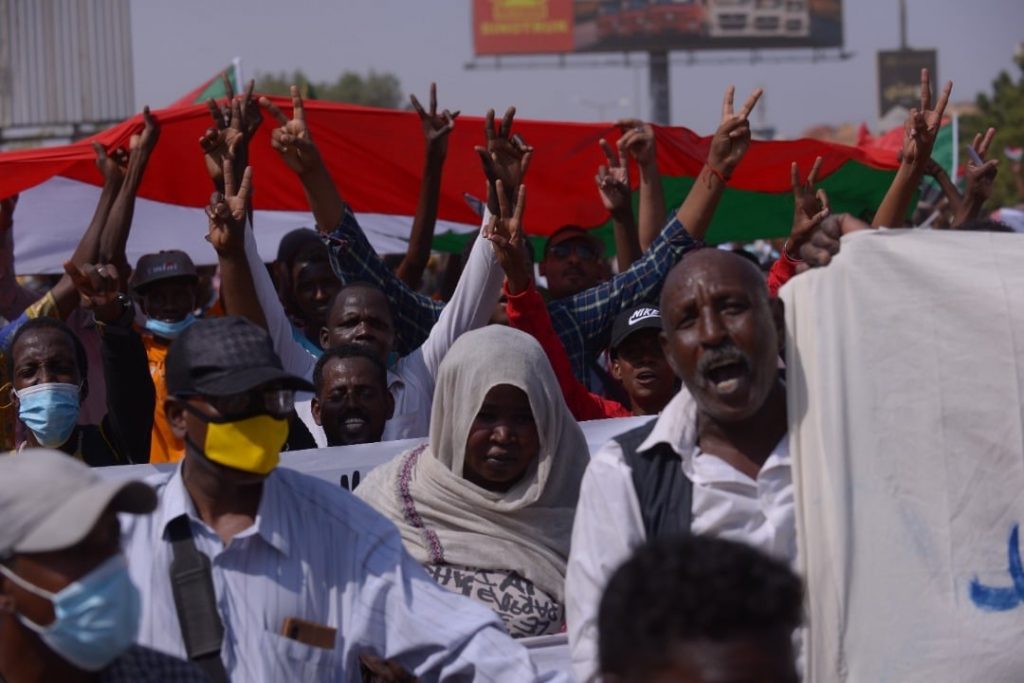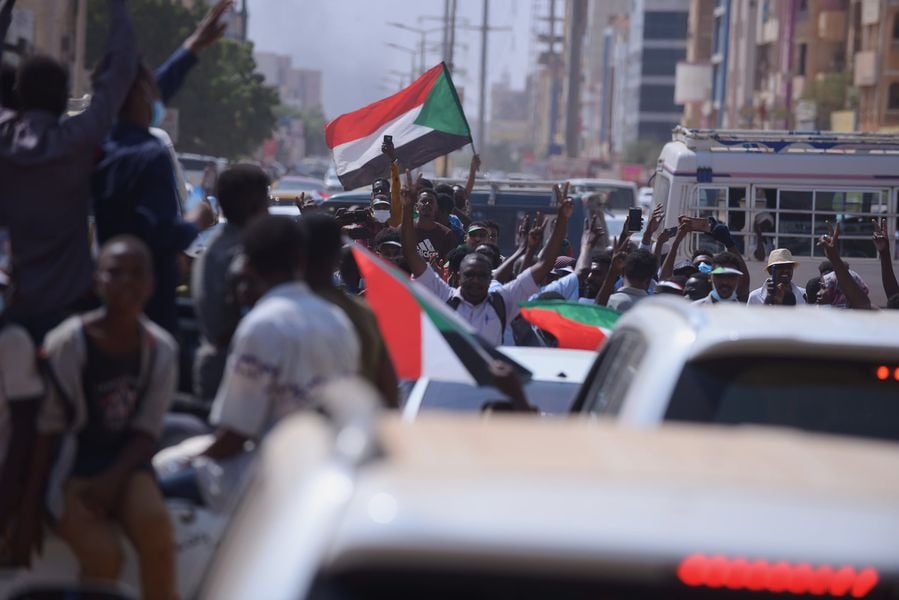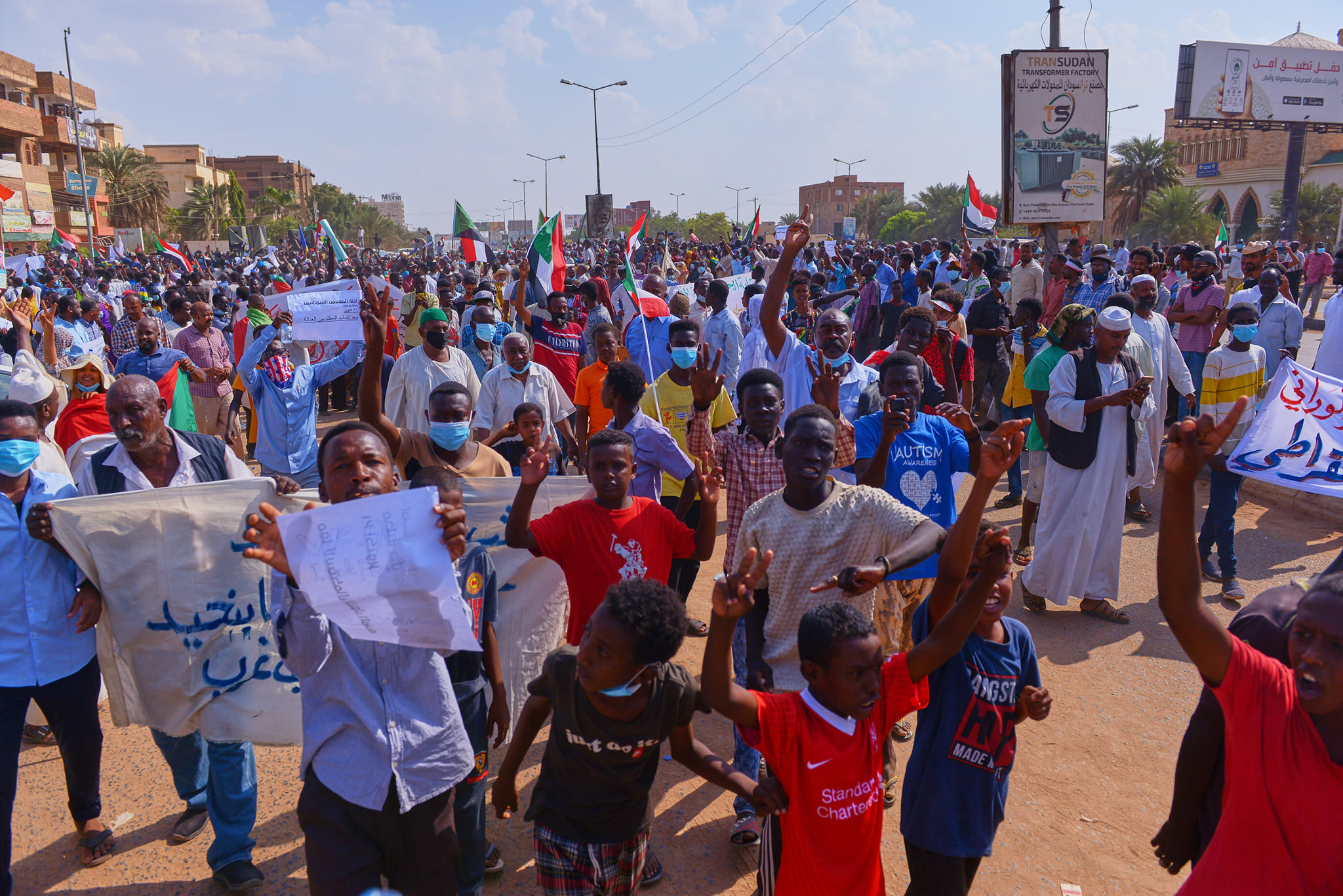Major Protests in Support of Civil Rule
21 October 2021
Today, hundreds of thousands of Sudanese people took the streets in the capital, Khartoum, and other cities demanding that the tasks of the revolution get completed while condemning the military’s recent attempts to overtake the civilian government.
At one point, police forces used tear-gas to disperse demonstrators near the parliamentary building in Omdurman, wounding 21 civilians. The police resorted to breaking the protestors by force when they tried to cross the White Nile Bridge that links the twin cities, Omdurman, and Khartoum.

The slogans chanted by people – which marks the anniversary of the October 21, 1964 revolution – varied between demanding the accomplishment of the goals of the revolution, ending the partnership with the military, and showing support to the civilian part of the government.
“I commemorate the citizens of my country on this great day,” announced Prime Minister Abdalla Hamdok in a statement. “I salute the millions of Sudanese who came out today in all cities, the countryside and the Diaspora, to confirm their commitment to the democratic civil transformation and the slogan of the December Revolution. Today the Sudanese people have proven and renewed their commitment to walk the path of freedom, democracy, and civil democratization.”
Representatives of the resistance committees, civilian-led organisations designed to protect the demands of the December 2019 revolution, addressed protesters in the east of the capital asking citizens to return to their neighbourhoods and start grassroots campaigns.
Similar marches took place in the eastern city of Gedaref, among other towns such as Atbara and multiple localities in Darfur, including several displacement camps.

Ousting the Palace Group
Many groups of protestors chanted slogans calling for the resignation of the head of the Transitional Sovereign Council, Lieutenant-General Abdel Fattah Al-Burhan, accusing the Sovereign Council leader of attempting to usurp power from the civilian component of the transitional leadership.
Since September, Sudan has experienced a series of events that have triggered political instability and supported the dissolution of the transitional government in favour of a military takeover. This includes: ongoing protests in Eastern Sudan led by a cadre of the former regime, Mohamed al-Amin Terk, an alleged coup, and a division within the Forces for Freedom and Change (FFC) that make up the current transitional government.
Besides requesting Al-Burhan to leave, protestors today also wanted the Minister of Finance, Jibril Ibrahim, the governor of the Darfur region Minni Arko Minawi, and the director of the Sudanese Mineral Resources Company, Mubarak Ardol, to resign after they launched an ongoing protest last Saturday, citing their separation from the FFC and calls for the dissolution of the transitional government.
Maryam Othman, 23, who participated in the peaceful protests today, told Ayin that today’s turnout represents a vital point in the democratic transition. She said that it shows the military component that Sudanese people will not allow a military rule to take place after ousting the dictator Al Bashir, and that people will stand in the way of any attempt to jeopardize the establishment of the civil rule.

On the other hand, Mrs. Nafisa Al-Amin, 67, seemed more reassured that the revolution would achieve its goals in full, after participating today in marches to support the transition. “The revolution will continue and be victorious by achieving full civilian rule,” she said.
Ahmed Hassan, 27, another demonstrator, complained about the government’s slow progress in achieving transitional justice. He said that the civil government did not carry out much-needed reforms in the judiciary institutions, explaining that he was prompted to participate in today’s demonstrations to demand retribution from those who killed the martyrs of the massacre of the General Command.
Sovereign Council Presidency
The first political response came from a press statement by FFC spokesperson Jaafar Hassan, acknowledging that today’s huge turnout demonstrates the public’s desire for civilian rule and authority over the Sovereign Council. He also pointed out the necessity of meeting the demands related to the integration of armies.
Meanwhile, Minister of Industry Ibrahim Al-Sheikh, a leader in the central committee of the FFC, participated in the protests in the capital where he was faced with many questions by the demonstrators regarding the delay in processing the demands of the revolution and the government’s failure to improve living conditions. He said that the closure of Port Sudan ports had a negative impact on the economic situation of the country. Al-Sheikh pledged to provide thousands of jobs for young people, explaining that the country obtained international funding worth US$ 100 million to finance youth-targeted projects.
Ahmed Hadrah, another member of the central committee of the FCC, told Ayin that the turnout today expressed their firm desire to protect the transition and stop the advances of the military that went as far as demanding the dissolution of the transitional government. He pointed out that the FFC will not compromise their position on the presidency of the Sovereign Council. Hadrah added that the crisis response team formed by Prime Minister Abdullah Hamdok is continuing consultations to bridge views.
The spokesperson for the Sudanese Professionals Association, Al-Waleed Ali Ahmed, told Ayin that hundreds of thousands who went out today should continue to demand ending the partnership between the military and civilian components of the regime.
Ahmed pointed that the turnout made it clear that people are tired of this partnership –stressing that the recent actions of the military component in the government make it unqualified to be a legitimate government partner. “This is an opportunity that must be used well,” he said regarding today’s demonstrations.


